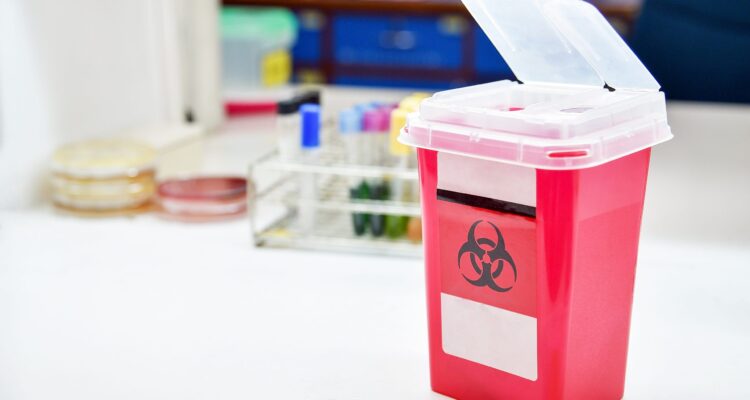Training and education are essential components of effective medical waste management. Healthcare professionals, facility staff, and other relevant parties need to have a comprehensive understanding of the best practices related to the proper handling, storage, transport, disposal, and recycling of hazardous medical waste. This knowledge can be acquired through training courses that cover topics such as safety protocols for personnel involved in managing waste streams; appropriate equipment selection and use; regulations governing the sector; and proper labeling procedures for identifying different types of waste.
Education also plays a critical role in ensuring compliance with applicable laws and regulations by providing individuals with the necessary background information to understand their responsibilities within the system. With an educated workforce equipped with the skills needed to properly manage hazardous materials, organizations can ensure they are doing their part in protecting public health while minimizing environmental risks associated with improper handling or disposal of medical waste. If you’re looking for comprehensive resources and solutions related to medical waste management, check out medwastemngmt.com.
Training and Education for Effective Medical Waste Management:
Training and education for effective medical waste management are essential to ensure safe practices in healthcare facilities. Medical waste can contain dangerous pathogens, so personnel must be properly trained on how to handle this type of material safely.
Training should include information about the different types of medical waste, proper storage and disposal procedures, regulations related to medical waste handling, and infection control techniques. Personnel should also be educated on risk factors associated with improper handling and disposal of medical waste such as aerosolization or contact with workers’ skin.
Education and training can help reduce errors that may lead to contamination risks or cause injuries due to unsafe practices. Through proper training, healthcare staff will become more aware of their responsibilities when dealing with hazardous materials like medical waste and be able to take the necessary steps towards ensuring safety within their facility.
1. Introduction to Medical Waste Management

Training and education are critical components of medical waste management. Not only is it essential that healthcare personnel understands the regulation and laws governing medical waste disposal, but also how to properly manage their own facilities’ medical waste.
Training helps ensure that staff is aware of the potential hazards associated with improper handling or disposal of biomedical wastes, such as infectious agents, chemical toxins, sharps, and hazardous materials.
Education ensures that person understands the importance of following established policies and procedures for disposing of different types of biomedical waste safely. Furthermore, training should include instruction on proper segregation techniques between red-bagged (potentially infectious) waste from non-infectious items.
2. Understanding the Risks of Unmanaged Medical Waste
Training and education are essential parts of effective medical waste management. Without proper training, employees may not understand the risks associated with unmanaged medical waste, such as exposure to hazardous materials or potential contamination of local water sources.
By providing comprehensive training and education to all staff members involved in managing medical waste, organizations can ensure that everyone knows the safety protocols required when handling these materials. Additionally, ongoing refresher courses should be provided regularly to keep everyone up-to-date on any new regulations or best practices related to medical waste management. This will help minimize risks by ensuring that all personnel involved have the necessary knowledge and skills needed for safe disposal.
3. Developing Best Practices for Medical Waste Disposal and Treatment

Training and education are essential components of effective medical waste management. Educating staff on the proper handling, storage, transportation, and disposal of medical waste is key to reducing exposure risks and preventing contamination.
Training should include information on relevant laws, regulations, and guidelines governing medical waste disposal; safe work practices; identification of hazardous materials; labeling requirements; container selection and handling procedures; decontamination techniques; disinfection methods; spill response protocols; personal protective equipment (PPE) requirements for workers that come into contact with wastes.
Additionally, employees should be informed about potential health hazards posed by various types of medical waste so they can take appropriate precautions when disposing of or treating it. Lastly, employers should ensure their personnel receives training in record-keeping procedures to document all activities related to medical waste management.
4. Legal Requirements for Properly Managing Medical Wastes
Training and Education for Effective Medical Waste Management are vital in ensuring compliance with all legal requirements. Knowing those regulations can help ensure that medical waste is properly managed and disposed of, protecting the environment and public health.
People who work on managing medical waste need to be trained on how to identify different types of hazardous medical waste, assess potential risks associated with them, understand applicable regulations, develop management plans for safely handling and disposing of it, as well as emergency response procedures if there’s an incident involving medical waste materials.
Additionally, they must be aware of any laws or regulations that may apply specifically to their workplace or area such as local ordinances governing the disposal methods used or policies related to labeling containers containing hazardous materials. With proper training and education, everyone involved in the management process can help protect human health by adhering to legal requirements for managing medical waste effectively.
5. Strategies to Reduce the Production of Health Care-Related Waste

Training and education on effective medical waste management are essential for reducing the production of healthcare-related waste. By educating staff about proper protocols for handling, segregating, and disposing of medical waste, hospitals can ensure that their practices comply with regulations.
Additionally, providing employees with the necessary resources to identify hazardous materials or potential risks associated with improper disposal can help reduce incidents related to the mishandling of hazardous materials. Furthermore, training staff on best practices for the reuse and recycling of items such as syringes, bandages, and other packing materials can also help cut down on healthcare-related waste production.
Finally, establishing guidelines for documenting waste management processes helps ensure that all procedures are followed correctly every time. These strategies will ultimately lead to a reduction in healthcare-related waste produced by healthcare facilities while ensuring safe practices throughout the organization’s operations.
6. Educating Staff on Proper Handling, Storage, and Transport of Hazardous Materials
The importance of training and education for effective medical waste management cannot be overstated. Employees must understand the proper handling, storage, and transport of hazardous materials to protect both themselves and the environment.
Staff must receive comprehensive instruction on how to safely manage potentially dangerous substances. This includes being aware of relevant laws and regulations as well as understanding labeling requirements for different types of waste.
Additionally, staff should learn about protective gear such as gloves or masks needed when interacting with certain materials. Training should also cover various procedures related to disposing of medical waste appropriately according to local guidelines. By providing employees with appropriate knowledge, organizations can help ensure safe handling practices are followed at all times.

